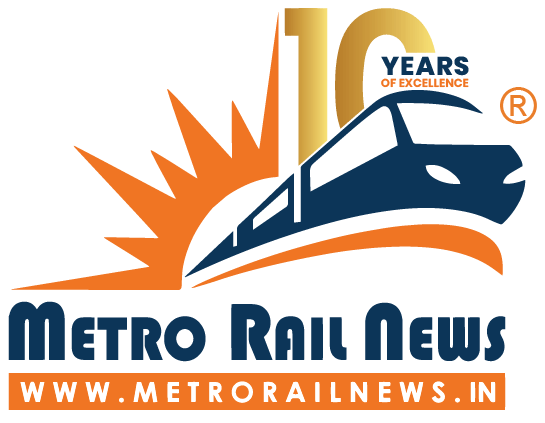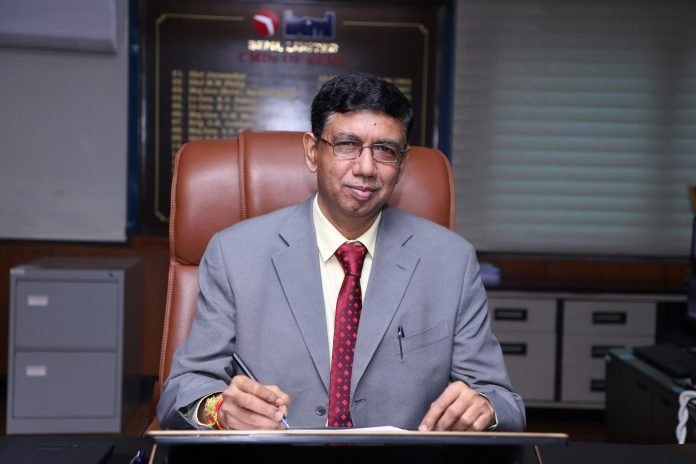NEW DELHI (Metro Rail News): Metro Rail News conducted an email interview with Shri Amit Banerjee, Chairman & Managing Director of BEML Limited, a public sector undertaking under the Ministry of Defence. In the interview, he discussed about Rolling Stock.
Shri Banerjee is a graduate of Mechanical Engineering from IIT (BHU), Varanasi. He joined as Assistant Engineer and has vast experience of over 37 years in R&D and manufacturing functions.
He has worked for the indigenous development of Metro Cars for Delhi, Jaipur, Kolkata, Bangalore & Mumbai, Stainless-Steel EMU & Intermediate Metro Cars, Catenary Maintenance Vehicle, and PMS Bridge for the Indian Army, among others. Before assuming the present position, Shri Banerjee was Director (Rail & Metro) BEML.
Here are the edited excerpts:
As the leader of one of the most promising manufacturing units in the country, what are the significant challenges you face, and how are you responding to them?
The most critical challenge is to keep our supply chain uninterrupted, control the increased input cost and maintain the margins. The current geopolitical situation and after-effects of COVID-19 have led to the increased price of input raw materials, viz. steel & aluminium and disruptions in logistics. As a result, we have taken advanced actions and have entered into long-term contracts with major suppliers to meet commitments.
Also, stiff competition in all segments of business against global players is a significant challenge. More than 70% of BEML orders from customers are won in open tenders involving global MNCs and local players. With increased input and labour costs, margins often have to be compromised.
Another critical challenge is the absorption and retention of talent as the Railway rolling stock business is growing. Some initiatives include forward-looking people practices, improving quality of life, open work culture, providing challenging roles, etc.
BEML is mandated towards indigenization and self-reliance of the country. What is the achievement percentage of the objectives? How do you rate yourself to the efforts of private players like Bombardier and Alstom in terms of quality & technology?
BEML has achieved an indigenization level of 66% to 70% in the manufacture and supply of Metro cars. BEML is further targeting to improve indigenization and develop alternate sources to ensure cost competitiveness.
BEML is on par with international players like Alstom and other Rolling stock suppliers in terms of Quality and Technology. BEML is the first Indian Rolling stock manufacturer to supply Rolling stock suitable for operation on CBTC Signaling system for Kolkata Metro. In addition, BEML is the first Indian Rolling stock manufacturer to Design, Manufacture and supply Driverless trains (UTO – Unattended Train Operation) to Mumbai Metro. After Delhi Metro, Mumbai is the second city in the country to have Driverless trains.
What are the major orders in the book? Which significant achievement of BEML in the last few years you shall quote to be one of the most influential for the country’s defence and non-defence sectors?
At present, the order book position of the Company is over Rs. 8000 crores comprising all three business verticals, i.e. Mining & Construction, Defence & Aerospace and Rail & Metro. Out of this, some of the major orders are Metro cars for Mumbai Metro Line 2 & 7, Main Line Electric Multiple Unit, Rail Grinding Machines in Rail & Metro business, Armoured Recovery Vehicle, Pinaka Vehicles, Track Width Mine Ploughs, 1500 HP engines for Defence applications, 21 Cu.m. Rope Shovel & high-end dozer, dump trucks and excavators in the Mining & Constructions business.
The most significant achievement which was influential in the growth of defence and non-defence sectors is the success of our R&D. Our R&D teams across all three business verticals have indigenously designed and developed several new products for the country. This has also been possible due to our government’s thrust towards Atmanirbharta.
Further, as a manufacturing Company and to sustain the market, we are continuously working on developing and upgradation of new products.
In Defence, keeping given emerging trends in technology and also in line with the unfolding business scenario, R&D has put in place a plan of action to develop a series of products/aggregates, such as the Development of a High Mobility Vehicle (HMV) 12×12, Self-propelled mine Burrier 8×8, Bar mine layer 8×8, Upgrading of Axles for higher load carrying capacity with ABS feature for use on chassis for special projects, Upgradation/Overhauling of Armoured Recovery Vehicle pilot project and Development of Trawl Roller & Track Width Mine Plough for demining operation.
Under Rail & Metro, the Rail Grinding Machine for maintenance of Rail Tracks is under production in addition to the driverless metro cars for the Mumbai metro.
Under Mining & Construction, we have taken up the design & development of 21 cu.m. Rope Shovel required for Mega Coal Projects.
The Indian Urban Rail Transport is getting widely scattered, with many cities opting for LRTs / Trams/MetroNeo etc. As a dominant player in Indian metro rolling stock manufacturing, what are your plans to meet this new trend and requirement of Indian cities? – RJ
BEML, as an established Indian rail car manufacturer, intends to fulfil the various needs of the customers by expanding our product portfolio as and when they arise and are keen to adapt our expertise and capacities for the purpose. These different urban transport modes, viz. metrolite / metronome/trams, are still in nascent stages and need to be proven. However, BEML keenly observes the market trend, and we shall tie up with global players or design agencies to address the same. We are also investing in our human resources, in-house R&D and manufacturing set-up for Design & Development.
The metros in the country are also looking for intermodal and last-mile connectivity. What are the ways through which you can contribute to this requirement of metro systems? Has there been any mentionable innovation or R&D?
Currently, the vehicles required for intermodal and last-mile connectivity are predominantly road based and, as such, not part of our product portfolio. However, BEML is keen to address the requirement of monorails / PRT / Pods as and when they arise.
What is the export status of the organizations? You have had several MoU and Tie-Ups with various organizations in the last few years. Please tell us about that. What have been the significant accomplishments? – MX.
BEML exported Mining & Construction equipment worth Rs 48.36 Crs in Fy 2021-22, which includes 32 pieces of equipment valuing Rs 35 Crs to the Roads & Highway Department, Bangladesh. In the current financial year, exported worth Rs 81.24 Crs till Nov 2022, which includes 31 Mining & Construction equipment valuing Rs 72.58 Crs to the Ministry of Economy, Planning and Regional Development (MOEPRD), Cameroon and further export of 40 Mining & Construction equipment valuing Rs 75 Crs is under execution.
The Important initiatives undertaken to cater to the requirement of the International Market are:
- BEML has registered its branch office in Kenya to expand its African market network.
- Widening Overseas market network through Representatives
- Participating in International Export Promotion Exhibitions
- JVs in India/abroad – MoU signed with RITES and exploring participation in overseas Metro Project along with RITES.
- BEML is exploring the possibility with DMRC to supply Rolling stock for metro projects globally.
- BEML is also exploring the possibility with IRCON to supply Rolling stock for the Mauritius Metro phase-IV.
What would be your message to youngsters and readers of our magazine especially?
As I am a regular reader of Metro rail News magazine, the articles and updates published in this magazine about the Metro Rail Industry and Infrastructure are pretty informative.
Also, readers, especially youngsters, must be aware that India has put its foot towards accelerating its growth and becoming a US$ 5 trillion economy by 2024-25. For achieving the same, know-why technology, indigenization of critical aggregates, increase in exports and entering into the service field by taking up equipment overhaul services and equipment as service is going to play a critical role. For us, lack of technology and know-why is a big challenge. Foreign OEMs are reluctant to invest in these fronts. A lot of things need to be evolved and worked out. We may look for an Industry-Academia interface to develop critical aggregates in India. We must gear up to adopt Atmanirbhar Bharat and make our country truly ‘Self Reliant’.





